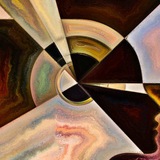Grad-CAM++: Generalized Gradient-based Visual Explanations for Deep Convolutional Networks
Abstract: Over the last decade, Convolutional Neural Network (CNN) models have been highly successful in solving complex vision based problems. However, deep models are perceived as "black box" methods considering the lack of understanding of their internal functioning. There has been a significant recent interest to develop explainable deep learning models, and this paper is an effort in this direction. Building on a recently proposed method called Grad-CAM, we propose Grad-CAM++ to provide better visual explanations of CNN model predictions (when compared to Grad-CAM), in terms of better localization of objects as well as explaining occurrences of multiple objects of a class in a single image. We provide a mathematical explanation for the proposed method, Grad-CAM++, which uses a weighted combination of the positive partial derivatives of the last convolutional layer feature maps with respect to a specific class score as weights to generate a visual explanation for the class label under consideration. Our extensive experiments and evaluations, both subjective and objective, on standard datasets showed that Grad-CAM++ indeed provides better visual explanations for a given CNN architecture when compared to Grad-CAM.
https://arxiv.org/pdf/1710.11063.pdf
#deep_learning #computer_vision
Abstract: Over the last decade, Convolutional Neural Network (CNN) models have been highly successful in solving complex vision based problems. However, deep models are perceived as "black box" methods considering the lack of understanding of their internal functioning. There has been a significant recent interest to develop explainable deep learning models, and this paper is an effort in this direction. Building on a recently proposed method called Grad-CAM, we propose Grad-CAM++ to provide better visual explanations of CNN model predictions (when compared to Grad-CAM), in terms of better localization of objects as well as explaining occurrences of multiple objects of a class in a single image. We provide a mathematical explanation for the proposed method, Grad-CAM++, which uses a weighted combination of the positive partial derivatives of the last convolutional layer feature maps with respect to a specific class score as weights to generate a visual explanation for the class label under consideration. Our extensive experiments and evaluations, both subjective and objective, on standard datasets showed that Grad-CAM++ indeed provides better visual explanations for a given CNN architecture when compared to Grad-CAM.
https://arxiv.org/pdf/1710.11063.pdf
#deep_learning #computer_vision
Are we done with ImageNet?
Abstract: Yes, and no. We ask whether recent progress on the ImageNet classification benchmark continues to represent meaningful generalization, or whether the community has started to overfit to the idiosyncrasies of its labeling procedure. We therefore develop a significantly more robust procedure for collecting human annotations of the ImageNet validation set. Using these new labels, we reassess the accuracy of recently proposed ImageNet classifiers, and find their gains to be substantially smaller than those reported on the original labels. Furthermore, we find the original ImageNet labels to no longer be the best predictors of this independently-collected set, indicating that their usefulness in evaluating vision models may be nearing an end. Nevertheless, we find our annotation procedure to have largely remedied the errors in the original labels, reinforcing ImageNet as a powerful benchmark for future research in visual recognition.
https://arxiv.org/abs/2006.07159
#benchmark #image_net #computer_vision
Abstract: Yes, and no. We ask whether recent progress on the ImageNet classification benchmark continues to represent meaningful generalization, or whether the community has started to overfit to the idiosyncrasies of its labeling procedure. We therefore develop a significantly more robust procedure for collecting human annotations of the ImageNet validation set. Using these new labels, we reassess the accuracy of recently proposed ImageNet classifiers, and find their gains to be substantially smaller than those reported on the original labels. Furthermore, we find the original ImageNet labels to no longer be the best predictors of this independently-collected set, indicating that their usefulness in evaluating vision models may be nearing an end. Nevertheless, we find our annotation procedure to have largely remedied the errors in the original labels, reinforcing ImageNet as a powerful benchmark for future research in visual recognition.
https://arxiv.org/abs/2006.07159
#benchmark #image_net #computer_vision
